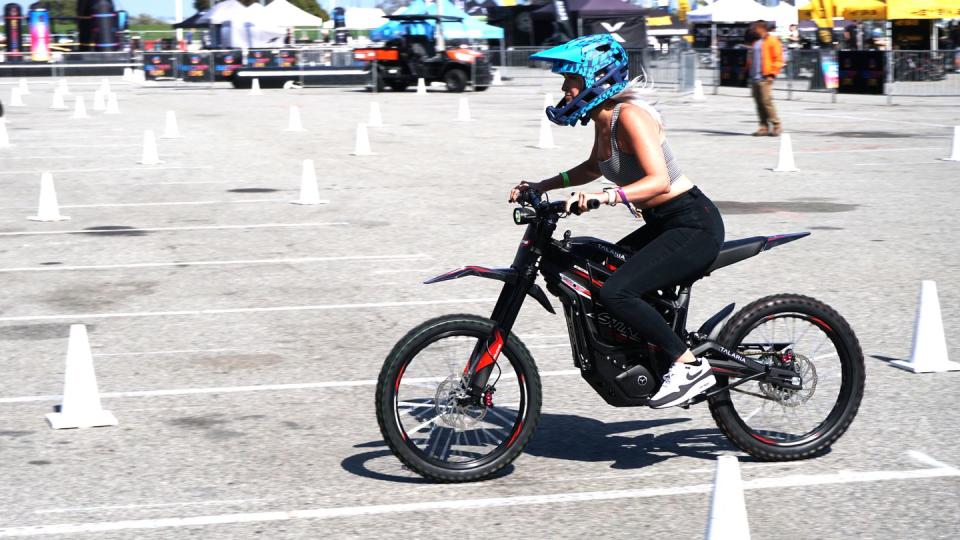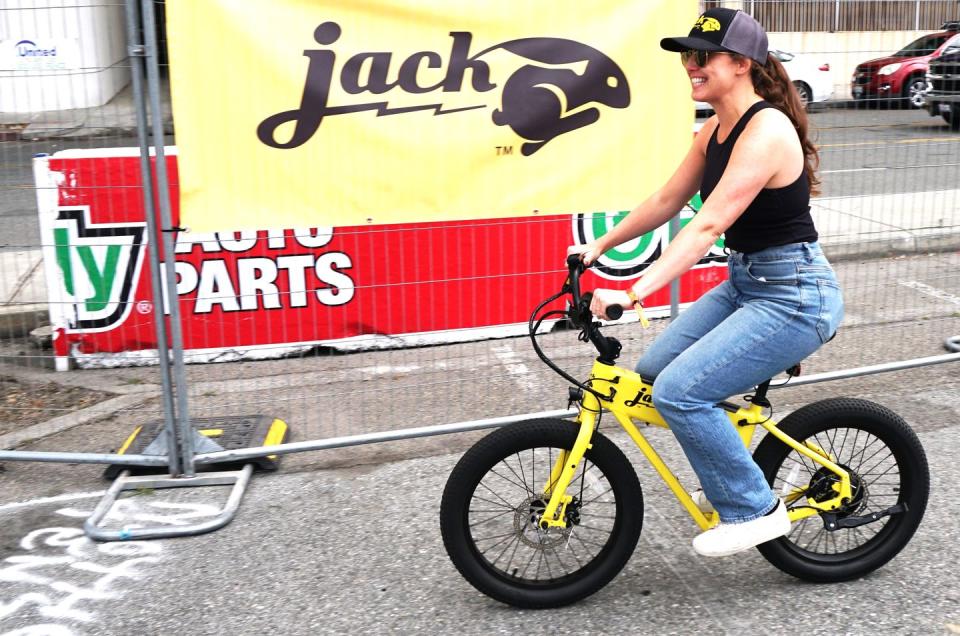Exactly Who the Chinese Tariffs Will Hurt First

The Biden Administration’s 100% tariffs on EVs will hurt smaller manufacturers of electric motorcycles, scooters, and bikes.
There were plenty of those exhibiting at Electrify Expo, a nationwide consumer tour of electric vehicles that completed its second stop last weekend in Long Beach, California.
Scooter, motorcycle, and e-bike prices could climb 25%, and manufacturing could move out of China and into Vietnam and Mexico and even back to the United States.
This year’s Electrify Expo looks to be bigger than ever before, with major carmakers and minor motorcycle manufacturers all vying for the attention of an increasingly eager electric vehicle market. But worries about the coming tariffs on Chinese-made electric cars, bikes, and scooters—not to mention batteries and motors—loomed just beneath the surface.
Just two weeks ago the Biden administration announced a 100-percent tariff on the importation of Chinese electric vehicles, effectively quadrupling tariffs established by the previous Trump administration. Lithium-ion batteries must also pay an increase, up from 7.5% to 25 percent tariff, rates which will cover a number of automotive and scooter-related goods and materials.
Most major carmakers represented at the Electrify Expo were not immediately affected, but smaller electric scooter and motorcycle manufacturers were worried.
“It’s unfortunate because the tariff is likely something we’re going to have to pass to our customers,” said Emily Johnson, chief marketing officer of JackRabbit Mobility in San Diego.
JackRabbit makes small, lightweight, and affordable electric scooters they call micro e-bikes, with a range of 10 miles that can easily fit in the trunk of most small cars or under the seat of a light rail commuter. Prices for a JackRabbit, one of which I rode around at the Expo and truly enjoyed, start at $1,000.
That’s thousands less than a typical e-bike, and represents an affordable transportation option for short commutes for city dwellers, or a last-mile alternative to anyone getting to work on a train.

With profit margins already slim on such an inexpensive product, increasing prices may be the only alternative for manufacturers.
“There really isn’t another option for us to for the critical and most expensive components that the tariff applies to, regardless of where the bikes’ final assembly happens, which for us is our battery and our motor,” said Johnson.
“Without support from the US government to encourage US electronics manufacturing at scale, there isn’t really a domestic comparison or option for us for years to come, and that’s likely the case with all the e-bike and EV brands here. And so, unfortunately, that’s a cost, like I said, that will likely have to pass off to our customers, which is something we don’t want to do, because there are very few low-cost and new-mobility options out there.”
“That affects a lot,” said Luis Liu, who imports electric bicycles from China under the name FreeGo. “The cost for the factories increased because the tax increased 25%. So maybe we’re thinking about increasing the retail price as well, because our profit margin is much smaller than before.”
For Liu that would mean increasing the price of a FreeGo bike by 15 or 20 percent to compensate for the new tariffs.
“Maybe we will share part of the increase, so the customer will be much more easier to accept that.”
Some importers are already dealing with the previous tariffs.

“We’re actually already paying 50% duty since Trump came into the picture,” said Joseph Chu, who imports neighborhood electric vehicles and small electric pickup trucks under the brand name PickMan (www.pickman.com).
“So, the 25% China tariff and the other 25% is what we call the chicken tax. If your vehicle is a cargo truck, carrying cargo, the Chicken Tax was from the 1970s, that was a while ago. So I was paying 50% tariff for a while. And then recently, the EV tariff should, my understanding is, it should only apply to passenger vehicles, not vehicles like this (he points to a small electric Pickman pickup truck).”
But Chu has a plan for any inevitability.
“Either way, we do have an assembly plant in Thailand, and we’re prepared for any other nonsense that might happen between the governments.”
Not all importers have the option of switching plants.
“I don’t think it’s very easy for now,” said FreeGo’s Liu. “Because the labor cost is much higher in USA, it’s about maybe five times higher than in China. We need to think about it (moving the factory), but not now.”

Some importers suggested moving from China to Vietnam or Mexico, where labor costs are similarly low, as a way to get around any increased tariffs. But some have figured out how to make products in the US.
“So for fully assembled bikes coming into the US there’s probably a 25% tariff,” said Bruce K. Riggs, CEO of Monday Motorbikes. “In our case, we don’t import any bike assemblies. We build bikes in Signal Hill, part of Long Beach, California. And so while I don’t think we have a tariff impact for the industry in general, I think there is a tariff impact something on the order of $200 to $300 a bike.”
But Monday Motorbikes is gregarious, willing to share its expertise in domestic manufacturing with others.
“I think it’s a great opportunity to move manufacturing back into the US,” said Riggs, who was a vice president at Dell computers in China for 14 years before coming back and starting Monday Motorbikes.
“We’re friends with a lot of folks in the industry and I think we like to keep good relationships in the industry. And so yeah, I think we are willing to help people understand how to go about building bikes in the U.S. at reasonable prices, and in reasonable logistics locations. So yeah, that’s a favorable part of the tariff is people want to come back in (to the US to manufacture).”
Which, some would argue, is the point of the tariffs to begin with.

 Yahoo Autos
Yahoo Autos 